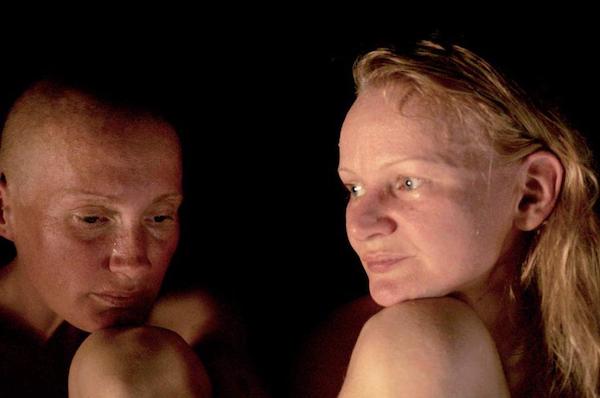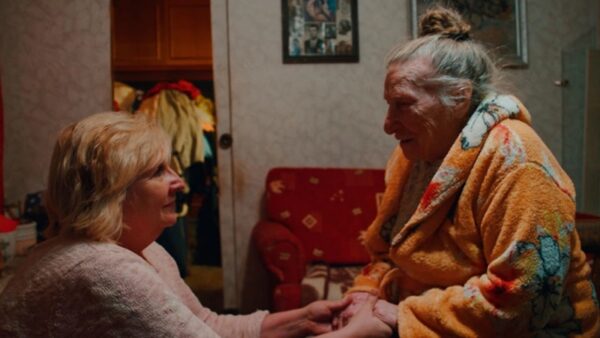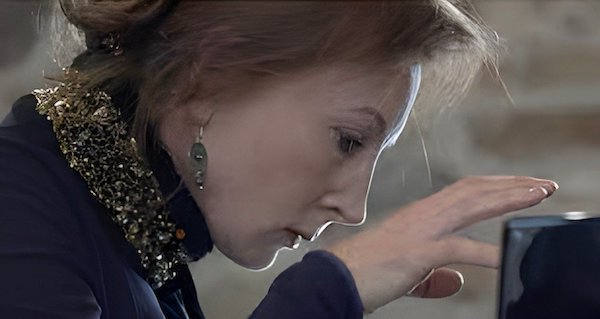Doc Talk: Smoke and Mirrors — Urgency and Gravitas at the Boston Baltic Film Festival
By Peter Keough
These films might not often directly address the looming menace of Russia, but the tragic history shared by the countries shadows even their moments of happiness, levity, and hope.
Every year the Boston Baltic Film Festival (March 1-3 at the Emerson Paramount Center; online March 4-18) offers outstanding documentaries that challenge the genre and one’s preconceptions about the subjects explored. Though the gathering’s themes are universal, the subjects and their treatment are as distinctive as the cultures they emerge from; the films possess a distinctive urgency and gravitas, qualities perhaps due, in part, to the existential threat posed by their malignant neighbor to the north. These docs might not always directly address the looming menace of Russia, but the tragic history shared by the countries shadows even their moments of happiness, levity, and hope.

A scene from Anna Hints’s Smoke Sauna Sisterhood.
The cabin in the woods in Estonian filmmaker Anna Hints’s Smoke Sauna Sisterhood (screens March 3 at 1:35 p.m. followed by a discussion with the director, and virtually March 4-18) provides a refuge — from the hardships of the everyday, the trauma of the past, and the toll of history — for the resilient women of the title. Located near a pond in Vana-Võromaa, a region in South Estonia, it stands in an idyllic place where the women practice the tradition of “savvusanna kombõ,” a sauna ritual in which they bare their souls as well as their bodies to the healing steam, smoke, and mutual support.
An early image seems ominous. One of the sisterhood leaders laboriously carves out a grave-like opening in the ice into which the women will later plunge. But what is being interred in this icy tomb are their fears, traumas, and self-imposed limitations. As they intone in a rhythmic crescendo of chants, “Become mighty! Become powerful!” and “Pain out! Pain out!”
And there is a lot of pain to sort through. As the women swelter naked in the smoke they confide their stories to one another. At first these are good-humored recollections of insecurities instilled by parents and peers, anecdotes greeted by knowing laughter and commiseration. Then the tone darkens, and they recall domestic violence, abuse, and injustice. Towards the end a giggly conversation about the childish names they were taught to call their private parts and grandmotherly lectures on the importance of virginity segues into a rape story that becomes more and more horrifying. Here, as happens throughout the film, the focus is not on the speaker, but on the listeners — silent, nonjudgmental, utterly empathetic.
Like forest spirits or a witches coven, the sisterhood traipses naked, regardless of the season, through the woods and into the pond. Inside the cabin their bodies in the firelight evoke a painterly, sensuous beauty. Tight close-ups resemble abstract canvases. Their confessional moments are punctuated by rhapsodic images of smoke, steam, fire, water, trees, the sky, and the forest. Backed by an uncanny and sublime soundtrack, this is more than just a catalogue of women’s grievances or an affirmation of solidarity — Smoke Sauna Sisterhood is a celebration of healing and the human spirit, a cinematic space rooted in prayer, meditation, and mystic contemplation.

A scene from Staņislavs Tokalovs’s Everything Will Be Alright.
Latvian filmmaker Staņislavs Tokalovs’s Everything Will Be Alright (screens virtually March 4-18) takes place mostly amidst the tchotchke- and clothing-cluttered Riga apartment of the filmmaker’s mother, Irina. In the background is the inescapable TV screen, often broadcasting Vladimir Putin delivering a New Year’s Eve or Victory Day speech. Those holidays, along with birthdays and other celebrations, are the events that are used to structure this fluid, fly-on the wall, deceptively simple, but epiphanic chronicle of four years in the subject’s life, focusing mostly on her relationship to her nonagenarian mother Nina, a Russian native who served heroically in The Great Patriotic War. Nina, along with hundreds of thousands of other Russians, relocated in the ’50s to the then Soviet Socialist Republic of Latvia in search of a better life.
Perhaps she found it, for her daughter Irina seems to have settled into a kind of prosperity with a respectable job as a university lecturer, a stolid if feisty husband, and a well-adjusted, talented daughter who by the end of the film has married a violin virtuoso and moved to the Netherlands. Pretty good for someone who never bothered to learn the native language and only speaks Russian — which proves a problem when the government insists that all university faculty teach in Latvian.
As the Putin presence indicates, Irina reveres the old country, its traditions, and its leadership. She forces an increasingly unwilling husband Raul to stand at attention when the Russian national anthem plays after a speech by her beloved Vlad. Every 9th of May, Victory Day, she dresses her mom up in her medal-festooned uniform jacket and wheels her out to the Victory Monument where veterans are honored and bedecked with flowers.
But her mother’s memory isn’t what it used to be, nor is that of her country, at least as far as Irina is concerned. When Covid strikes, the celebrations are stripped down, with stern, masked police limiting access to the monument. Her mother’s health worsens, and the old woman serves as a tragic metaphor for Irina’s deteriorating faith in her Russian ideal. Poignantly paralleling her mother’s decline is that of Irina’s ancient dog, reduced to diapers and finally taken to the veterinarian for what Irina hopes will be a miracle cure. “Everything will be alright,” her daughter consoles her when that proves not to be the case.
Irina attends the Victory Day memorial alone in 2022, just months after the Russian invasion of Ukraine. Not many flowers for vets this time. Instead there are placards with images of Russian atrocities, and in the end the ugly, phallic obelisk itself is razed to the ground.
Also recommended are two other documentaries on the program.

A scene from Agnė Marcinkevičiūtė’s Muza.
Agnė Marcinkevičiūtė’s Muza (screens March 2 at 8:30 p.m. at the Emerson Paramount Center followed by a discussion with the director) is a rich profile of the brilliant Lithuanian pianist Mūza Rubackytė. A prodigy who won competitions but was held back from touring the world by the Soviet authorities because of her political activities on behalf of freeing her country, Mūza persevered nonetheless and shared her talents with the world. The film is a must-see for the thrilling performances alone.
Estonian-Dutch director Helga Merits’s The Paradox of Seabrook Farms (screens March 3 at 11 a.m. at Emerson Paramount Center followed by a discussion with the director), is a study of a rare instance of positive unintended consequences. In New Jersey in the ’50s Charles Franklin Seabrook was creating the biggest food processing plant in the world. But he needed cheap labor, and historical developments provided him with plenty — Black families fleeing the Jim Crow South, Japanese families recovering from World War II internment, and refugees from Nazi and Soviet oppression fleeing Eastern Europe, including many from the Baltic countries. He exploited these desperate people, but also created a kind of hardscrabble, multicultural enclave that those who lived there as children recall with affection. A parable of capitalism at its worst — and best.
Peter Keough writes about film and other topics and has contributed to numerous publications. He had been the film editor of the Boston Phoenix from 1989 to its demise in 2013 and has edited three books on film, most recently For Kids of All Ages: The National Society of Film Critics on Children’s Movies (Rowman & Littlefield, 2019).
Tagged: Agnė Marcinkevičiūtė, Anna Hints, Baltic Film Festival, Everything Will Be Alright, Helga Merits, Muza, Mūza Rubackytė, Smoke Sauna Sisterhood
